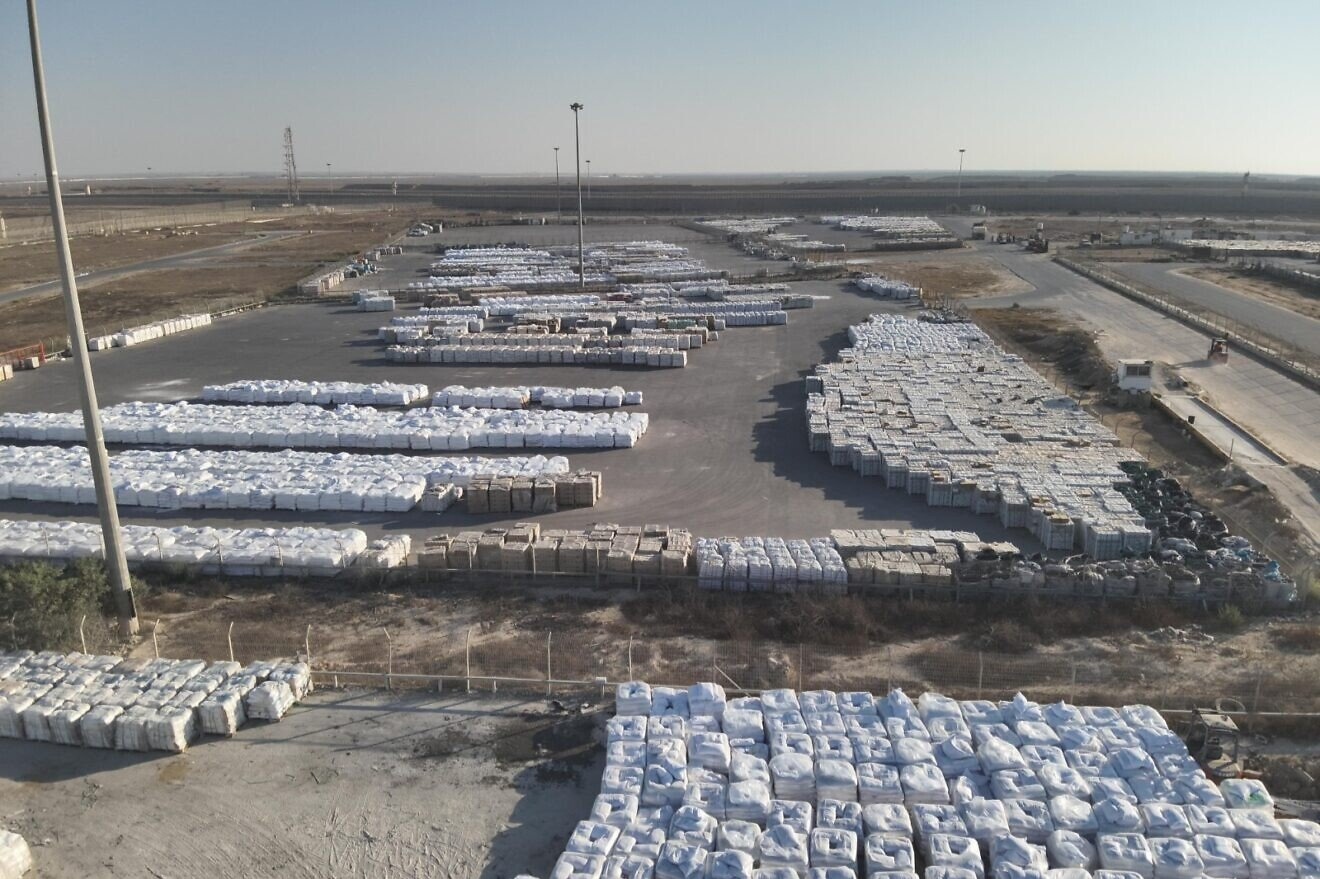
A cornucopia of aid supplies, mostly food, has accumulated in recent months on the Gazan side of the crossings to the Gaza Strip and is still waiting to be collected by international aid organizations, the Coordinator of Government Activities in the Territories (COGAT) — a unit within Israel's defense ministry — said on July 25, 2025, in the wake of claims that Jerusalem is preventing food from entering the Strip.
COGAT released extensive footage showing the hundreds of trucks on the Gaza side of the Kerem Shalom Crossing, with rows of boxes of supplies stacked on pallets.
"Israel does not limit the number of trucks entering the Gaza Strip, and it is the collection issue that is preventing the continuous delivery of humanitarian aid into Gaza," said COGAT's head of the Coordination and Liaison Administration for Gaza, Col. Abdullah Halabi, speaking from the Gazan side of the crossing with bundled-up boxes of supplies in the background.
"Despite the clear facts you can see behind me, Hamas is running a deliberate and false propaganda campaign that presents a distorted picture of the humanitarian situation," he said.
Halabi stressed that Hamas is engaged in propaganda, not "out of concern for Gazan residents but as a pressure tactic in the framework of negotiations" with Israel over the release of the remaining hostages held in the Strip.
"We operate every day to bring in aid; Hamas operates every day to create a perception of crisis," the officer said. "The international community needs to know the truth. We are working in close coordination with the U.N. and aid organizations, urging them to continue arriving to collect the aid and bring it to the Gaza Strip."
Nevertheless, some of the aid is making its way to the Gaza Strip. COGAT tweeted that on Friday, around 90 food trucks were unloaded at aid crossings, and more than 100 were collected by the U.N. and international organizations from the Gazan side and distributed in Gaza.
U.S. Ambassador to Israel Mike Huckabee shared photos on X of the aid waiting to be distributed, saying that there is "enough food to feed all of Gaza but it sits rotting! UN is a tool of Hamas! US based GHF is actually delivering food FOR FREE and SAFELY. UN food is either looted by Hamas or rots in the sun!"
The U.N. claims that IDF restrictions on its movements and criminal looting hinder its ability to deliver aid.
"These factors have put people and humanitarian staff at grave risk and forced aid agencies on many occasions to pause the collection of cargo from crossings controlled by the Israeli authorities," said Olga Cherevko, a spokesperson for the U.N. Office for the Coordination of Humanitarian Affairs, or OCHA, Associated Press reported.
OCHA said on its website that the breakdown of law and order, partly due to the collapse of Gaza's Hamas-run police force, leads to greater risks for the truck convoys moving within the Gaza Strip in the face of criminal gangs.
According to U.S.-based Foundation for the Defense of Democracies (FDD), the U.N. aid mechanism has allowed Hamas to hijack and hoard the aid for many months during the war, with the terrorist organization making hundreds of millions of dollars selling the supplies on the secondary market while ordinary Gazans go hungry.
The introduction of Gaza Humanitarian Foundation (GHF), however, managed to bypass this mechanism, depriving Hamas of its funds, Enia Krivine, the senior director of FDD's Israel Program and National Security Network, said on the FDD website on Thursday.
"Hamas understands that if it doesn't regain control of the aid economy in Gaza, its days of ruling the enclave will be over. By refusing to work with GHF, the United Nations is shamefully throwing a lifeline to Hamas," Krivine added.
Meanwhile, President Donald Trump on Friday expressed frustration over the deadlock in U.S.-mediated negotiations aimed at securing a ceasefire-for-hostages agreement between Israel and Hamas, placing the blame squarely on the Palestinian terrorist group.
"It was too bad—Hamas didn't really want to make a deal," Trump said. "I think they want to die. And it's very, very bad. It got to a point where you're going to have to finish the job."
"Don't forget, we got a lot of hostages out," he continued. "So now we're down to the final hostages, and they know what happens after you get the final hostages. And basically because of that, they really didn't want to make a deal. I saw that."


